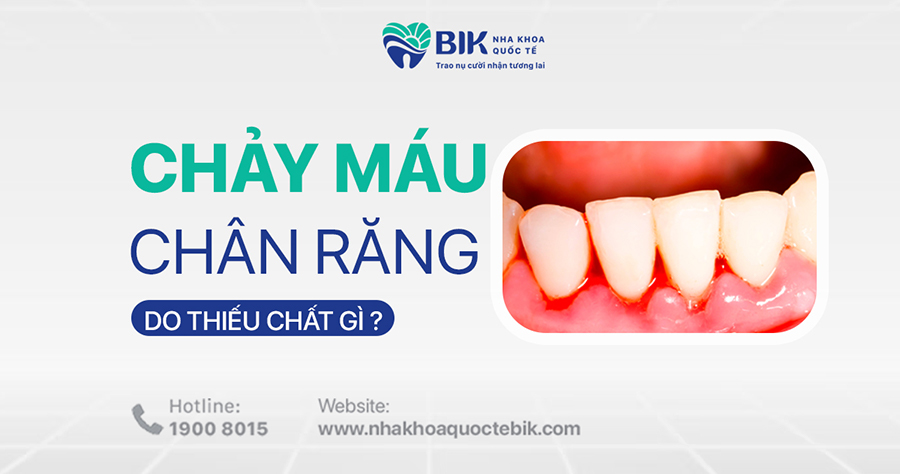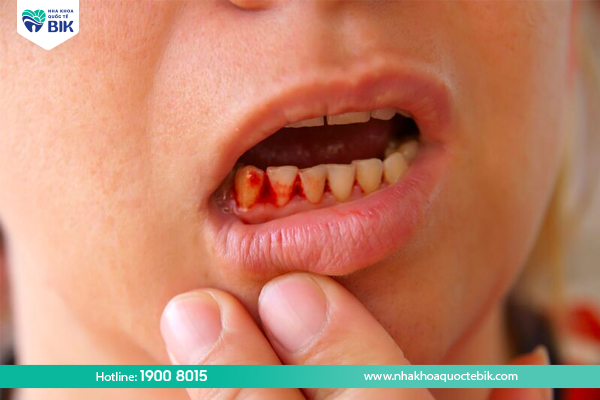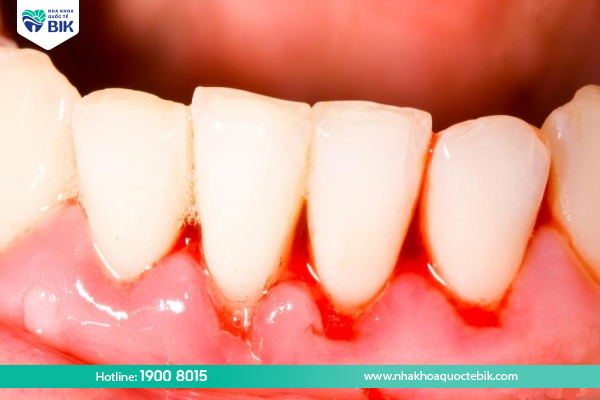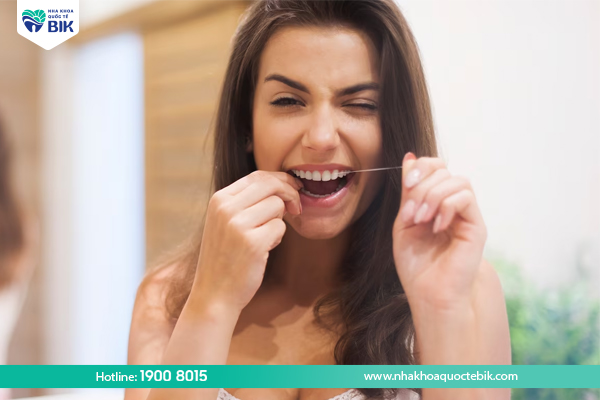
Bleeding gums not only occur when there is a strong external impact that damages the gums, but can also be due to the body lacking essential nutrients for a long time. So what is the lack of nutrients in bleeding gums depends on each person’s diet, you should refer to the article below and consider supplementing the necessary foods.
1. What is the lack of nutrients in bleeding gums?

Bleeding gums can appear due to a deficiency of the following essential substances:
1.1. Bleeding gums due to calcium deficiency
Calcium is an indispensable substance in maintaining the strength of both bones and teeth. In addition, calcium can also support the blood clotting process and prevent bleeding when blood vessels are damaged. Therefore, when the body lacks this essential substance, it will increase the risk of bleeding gums.
You can supplement calcium for your body through some foods such as: eggs, milk, chicken, seafood, cabbage, carrots, …
1.2. Bleeding gums due to lack of phosphorus
A lack of phosphorus in the body can also cause teeth to become weak and loose, which is also an opportunity for bacteria to attack the gums and teeth, causing gingivitis, periodontitis and bleeding gums.
The body does not absorb phosphorus directly but needs to be supplemented through other nutrients such as protein and calcium by adding foods such as milk, eggs, seafood, fish or beans to daily meals.

1.3. Bleeding gums due to zinc deficiency
Zinc is also an important substance in preventing gingivitis and bleeding gums. You can supplement zinc for your body through foods such as oysters, beef, milk, mushrooms, nuts, etc.
1.4. Bleeding gums due to vitamin C deficiency
Vitamin C is a basic substance and plays a very necessary role in the process of supporting immune enhancement and improving resistance to help the body fight against inflammatory agents. Insufficient vitamin C supplementation will affect the production of collagen in capillaries, bone tissue and connective tissue. Gums may no longer be rosy and can easily lead to bleeding gums when chewing or brushing teeth.
1.5. Bleeding gums due to lack of vitamin K
Vitamin K is a substance that helps speed up the blood clotting process, so when it is lacking, the blood will become thin, unstoppable and bleed more and longer than normal. You can supplement vitamin K through foods such as asparagus, kale, cabbage, mustard, parsley,…
2. Causes of non-stop bleeding gums

In fact, if bleeding gums last for many days without improvement when performing some home remedies for bleeding gums, it is very likely a sign of some other diseases:
2.1. Gingivitis
Gingivitis is a fairly common disease and almost all cases are caused by dental plaque. These plaques are the deposits of food particles and saliva in the oral cavity that have not been cleaned for a long time. Over time, they will accumulate into a thick plaque between the tooth root and the gum.
Bacteria that exist in plaque develop very strongly, they will attack the gums causing gingivitis. The gums at this time become quite sensitive, so they will bleed easily under external influences.
2.2. Some oral diseases
In addition, some other oral diseases such as tooth decay, tooth root infection can also lead to prolonged bleeding of the gums. In particular, diseases in the area around the teeth, if left untreated for a long time, will become more severe and make treatment more difficult.
2.3. Due to systemic diseases
In fact, prolonged bleeding of the gums can also be due to some liver diseases that affect the blood clotting function of this organ. In addition, another cause is the long-term use of drugs to treat chronic diseases. Patients with heart disease, stroke or using anti-epileptic drugs, diabetes,… have a higher rate of bleeding gums than normal people.
3. Foods to Avoid When You Have Bleeding Gums

When experiencing bleeding gums, in addition to supplementing the missing nutrients, patients need to limit certain foods to avoid the bleeding from becoming more serious:
– Foods high in sugar and starch such as candy, soft drinks, etc. These are substances that are easily converted into plaque in the oral cavity if not cleaned thoroughly. They will gradually accumulate and cause many other oral diseases.
– Drinking drinks such as coffee, energy drinks or smoking will dry out your mouth, creating favorable conditions for bacteria to attack and cause inflammation.
– Foods that are too hard or chewy will easily get stuck between your teeth, causing swelling, gingivitis and difficulty recovering from bleeding gums.
4. How to prevent bleeding gums
To prevent bleeding gums, you should note the following:
4.1. Brush your teeth

– Choose a soft-bristled toothbrush with a size suitable for the oral cavity to easily remove plaque on the tooth surface.
– Replace the toothbrush periodically about every 3-4 months to ensure that bacteria do not accumulate and attack and damage the tooth roots.
– In addition, you can choose to use toothpaste containing fluoride with the appropriate content. This substance helps clean, prevent tooth decay and support stronger teeth.
– Brush your teeth at least twice a day with moderate brushing force, avoid damaging the gums and causing bleeding.
4.2. Using dental floss
Dental floss is a fairly common oral hygiene tool that helps remove plaque and food debris stuck between teeth. Dental floss is often used after eating for quick cleaning, especially for people with crooked teeth and many tight spaces that make it easy for food to get stuck. You just need to cut a sufficient length of dental floss and insert it into the gap between teeth to clean between teeth. Be careful not to use too much force to avoid damaging the gums.

4.3. Combining mouthwash
Mouthwash has always been an effective method of cleaning the oral cavity from the past to the present. This solution contains special substances that help completely eliminate bacteria, prevent them from growing and attacking, leading to other oral diseases, especially preventing bleeding gums.
Use a sufficient amount of mouthwash to hold in the mouth for about 30 seconds, then spit it out and rinse your mouth thoroughly with clean water. Note that you should not eat or drink for at least half an hour after rinsing your mouth.
4.4. Periodic scaling
In addition to performing daily oral hygiene measures at home, you should visit the dentist regularly at least every 6 months to have your tartar removed and check your overall oral health. This helps the doctor promptly detect other oral diseases, if any, and then take appropriate treatment measures.
So bleeding gums is a lack of nutrients depending on each person’s diet. You should pay attention to adding natural foods to each meal to fully supplement the necessary nutrients to help teeth stay strong and prevent bleeding gums. In case bleeding gums persist, you should see a specialist at BIK International Dental Clinic for further examination and consultation.


















